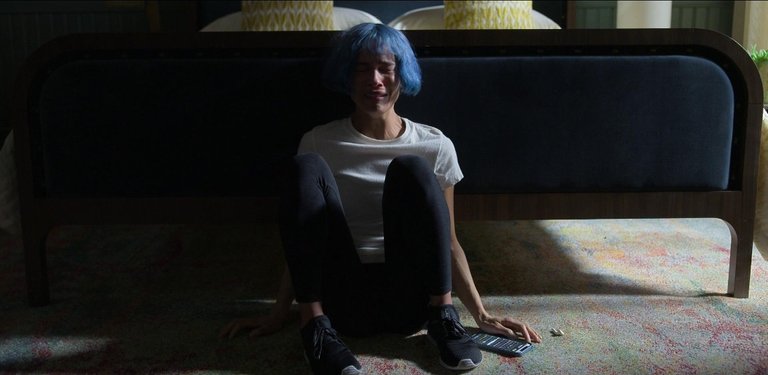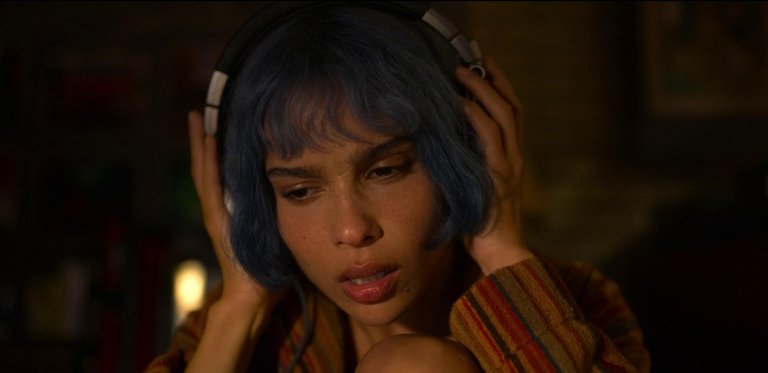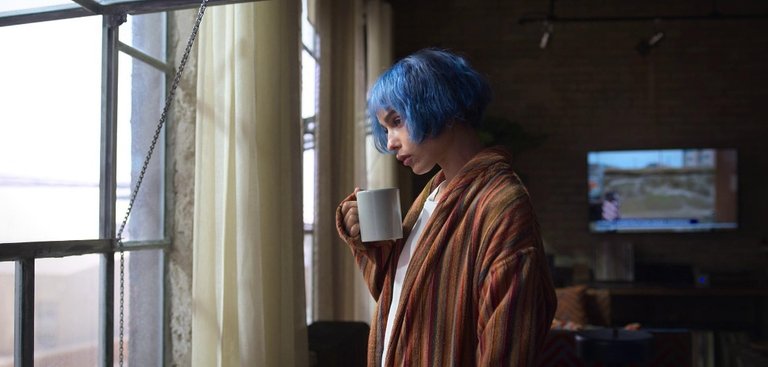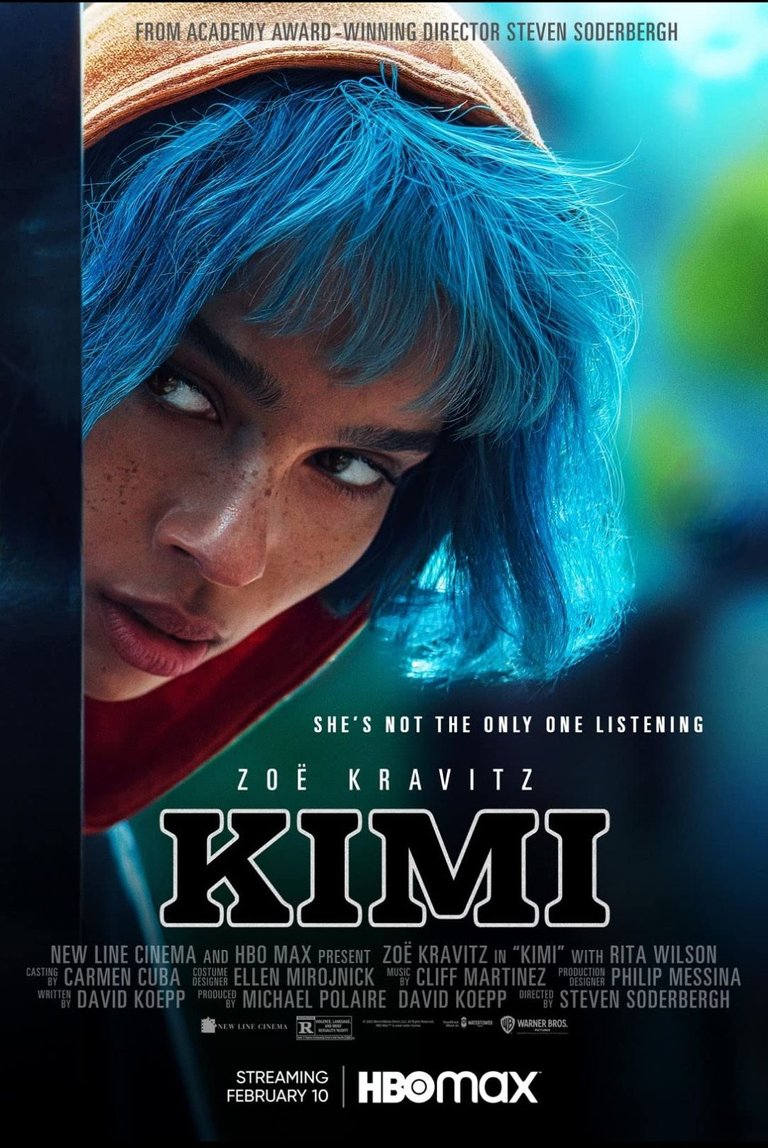Español

Imagen editada en Canvas
Siempre me he preguntado… ¿realmente tenemos privacidad? En un mundo tecnológico donde son más frecuentes las aplicaciones que usan nuestros datos personales, ¿cómo saber si somos espiados a escondidas? Esa pregunta es realmente difícil de responder, aunque los indicios apuntan a que, como diría mi abuela, hoy las paredes tienen más oídos que nunca. Obviamente son solo ideas mías, no paranoicas, pero que han tenido su origen en un film. Su nombre: KIMI, una historia donde el suspenso cobra vida de la mano de una chica con trastornos mentales.
Seguramente ya has escuchado hablar de Siri o incluso del asistente personal de Google. Para aquellos que no están familiarizados con estos términos, ambas aplicaciones funcionan como herramientas que nos ayudan en muchas de nuestras tareas digitales, tanto como para crear playlist de nuestros cantantes favoritos como para organizar nuestra propia agenda. Para ello solo debemos activar dichas herramientas con nuestra voz, ¡y el futuro está a la palma de nuestra mano! Kimi es la versión ficticia de estos asistentes, y la detonante de un asesinato que llega, a través de los comandos electrónicos, al ordenador de Angela Childs…
Ella es la chica que tendrá que vencer su miedo a salir de casa para poner en evidencia tanto el asesinato como a la empresa que intenta mantener todo en secreto. Dicha corporación, llamada Amígdala, ha sido la precursora de la aplicación KIMI en Norteamérica, sin embargo, el oscuro secreto que hay detrás proviene de la vulnerada privacidad de sus clientes. Es curioso que esta violación de los parámetros haya sido capaz de develar la muerta de una mujer... ¿cómo? Hablemos más del contexto de la historia.

Fuente: IMDB
Angela Childs trabaja como moderadora de Kimi y su tarea consiste en atender los audios de los usuarios que no han sido validados por el asistente. O sea, ella es la que se encarga de generar nuevas funcionalidades a la herramienta de Kimi a través de los errores en la base de datos de la aplicación. Eso significa que Angela debe rastrear el algoritmo, ir a la fuente y, en pocas palabras, escuchar lo que no debería escuchar. Hay un problema de fondo: ella sufre de agorafobia, una condición que la obliga a permanecer en su casa por miedo a peligros inexistentes.
Una noche, mientras hace su ordinaria rutina de trabajo, escucha lo que parece ser un asesinato sangriento grabado por la victima desde aplicación de KIMI. A partir de aquí Angela deberá enfrentarse a sus propios miedos para poner en evidencia el crimen, a expensas de una organización que desea verla muerta antes de que la verdad detrás de Kimi salga a la luz… ¿lo logrará? Este es el asunto trascendental del largometraje.
Kimi es una película cerrada, o sea, los detalles solo se centran en la visión de su protagonista, sin concentrarse en tramas secundarias o personajes terceros. Ángela no se aparta de la cámara desde el principio hasta el fin, pues todo gira alrededor de sus miedos e sus inseguridades. Mucho de esta película me recordó al Thriller clásico, ese donde los ojos viran solo a un puñado de escenarios. Es una película corta, con apenas una hora y veinte nueve minutos de extensión, algo que suele ser llamativo siempre y cuando se mantenga el suspenso…
¿KIMI mantiene el suspenso?

Fuente: IMDB
Lo mismo me pregunté mientras veía la película. Resulta que los largometrajes que suelen ser cortos deben manejarse de forma inteligente, porque de lo contrario los hechos que transcurren pueden caer en la inconformidad del espectador. Esto según mi humilde criterio, desde luego, y en este sentido KIMI puede imitar el reflejo de su propia protagonista. Es una obra que no mantiene un mismo ritmo, y que puede resultar incluso lenta y algo torpe. ¿La razón? Quizás que no hay tanta profundidad en el argumento, y vemos personajes que aparecen y desaparecen de las tomas solo para contribuir al avance de la historia. Esto en particular no me gustó.
O sea, hablando desde la óptica del escritor, una historia engancha por la profundidad de sus personajes y la implosión de los escenarios, eso a lo que llamamos “acción”, no el género, sino lo definido (según yo, XD) como aquello que hace avanzar una historia. Kimi en este aspecto es una obra muy lineal, muy simple. Por supuesto, este defecto dependerá de quien pueda analizar el film desde la visión técnica. Lo rescatable de la historia es su atmósfera turbia, sintetizada en una mujer trastornada por un pasado doloroso. Un trauma sin precedentes…
¿Y qué mejor que la actriz Zoe Kravistz para personificarlo?
Aquí si no tengo duda de la calidad de Zoe para hacernos comer el cuento. Si algo debo decir, es que ella es lo más rescatable de toda la película. A esta actriz le quedan muy bien los roles traumáticos, quizás porque los sabe personificar con una complejidad asombrosa. Antes ya la había visto trabajar en otras historias como Big Little Lies y Animales Fantásticos. En Kimi la vemos como una clásica mujer moderna, con el cabello de colores y una vestimenta notablemente anti-detallista. ¡Me fascina su rol como mujer fuerte! Esta característica fue lo que más me atrajo del film.

Fuente: IMDB
Como dije antes, Kimi es un largometraje que encierra su argumento en un cúmulo de personajes poco recurrentes, entre ellos el que protagoniza el actor mexicano Jaime Camil, otro que me sorprendió no por su actuación, sino por el papel que interpretó en la película. O sea, Camil es un comediante muy representativo, incluso todavía recuerdo su trabajo en el remake mexicano de Betty la Fea. Para mí fue imposible tragarme el cuento de un Jaime Camil con un personaje oscuro y frívolo, incluso sus gestos me causaron algo de risa. Quizás sean cosas mías, después de todo lo mismo me pasa con Eugenio Derbez, LOL.
En aspectos generales, KIMI es una película que logra ser entretenida hasta cierto punto. No es un largometraje de diez estrellas, pero al menos se esfuerza por mantener una trama atractiva a lo largo de las escenas. Además está el asunto que implica la tecnología y nuestras vidas personales… y todo el lío con respecto a la privacidad que hay detrás. Solo les puedo decir que ya no veo el asistente de Google con los mismos ojos, LOL.
Más allá de todo el problema de fondo, el largometraje tiene mucha de la esencia del suspenso. Creo que lo más resaltante es la forma en la que podemos apegarnos al personaje de Angela, e incluso compadecerlo. Solo me queda decir que a veces es bueno que las paredes escuchen, pues solo así, en caso de un imprevisto peligroso, tendremos el testimonio de alguien que al igual que nosotros, desea hacer justica.
Poster Oficial

Fuente: IMDB
Tráiler Oficial
English

Image edited in Canvas
I've always wondered ... do we really have privacy? In a technological world where applications that use our personal data are more frequent, how do we know if we are spied for hidden? That question is really difficult to answer, although the indications suggest that, as my grandmother would say, today the walls have more ears than ever. Obviously they are only my ideas, not paranoid, but have had their origin in a film. His name: Kimi, a story where the suspense comes to life from the hand of a girl with mental disorders.
Surely you have heard of Siri or even Google's personal assistant. For those who are not familiar with these terms, both applications function as tools that help us in many of our digital tasks, both to create playlist of our favorite singers and to organize our own agenda. For this we must only activate these tools with our voice, and the future is at the palm of our hand! Kimi is the fictitious version of these assistants, and the trigger for a murder that arrives, through electronic commands, to the computer of Angela Childs ...
She is the girl who will have to overcome her fear to leave home to highlight both the murder and the company that tries to keep everything secret. This corporation, called Amonala, has been the precursor of the Kimi application in North America, however, the dark secret behind the violated privacy of its clients. It is curious that this rape of the parameters has been able to reveal a woman's dead ... how? Let's talk more about the context of history.

Source: IMDB
Angela Childs works as a Kimi moderator and her task consists in attending the audios of users who have not been validated by the assistant. That is, she is responsible for generating new functionalities to the Kimi tool through the errors in the application database. That means that Angela must trace the algorithm, go to the source and, in a nutshell, listen to what she should not hear. There is a background problem: she suffers from agoraphobia, a condition that forces her to remain in her house for fear of non -existent dangers.
One night, while she makes her ordinary work routine, she listens to what seems to be a bloody murder recorded by the victim from Kimi application. From here Angela must face her own fears to highlight the crime, at the expense of an organization that wishes to see her dead before the truth behind Kimi comes to light ... Will she achieve it? This is the transcendental matter of the feature film.
Kimi is a closed movie, that is, the details only focus on the vision of its protagonist, without concentrating on secondary frames or third -party characters. Angela does not depart from the camera from the beginning to the end, because everything revolves around her fears and her insecurities. Much of this movie reminded me of the classic thriller, where the eyes turn only to a handful of stages. It is a short film, with just an hour and twenty minutes of extension, something that is usually striking as long as the suspense is maintained ...
Kimi keeps the suspense?

Source: IMDB
I wondered the same as I watched the movie. It turns out that the feature films that are usually short must be handled intelligently, because otherwise the facts that pass can fall into the spectator's disagreement. This according to my humble criteria, of course, and in this sense Kimi can imitate the reflection of its own protagonist. It is a work that does not maintain the same rhythm, and that can be even slow and something clumsy. The reason? Perhaps that there is not so much depth in the argument, and we see characters that appear and disappear from the shots only to contribute to the advance of the story. I did not like this in particular.
That is, speaking from the writer's perspective, a story hooks by the depth of his characters and the implosion of the scenarios, that we call "action", not gender, but what is defined (according to me, xD) like that that makes a story advance. Kimi in this aspect is a very linear, very simple work. Of course, this defect will depend on who can analyze the film from the technical vision. The rescueable thing about history is its murky atmosphere, synthesized in a woman upset by a painful past. Unprecedented trauma ...
And what better than actress Zoe Kravistz to personify it?
Here if I have no doubt about Zoe's quality to make us eat the story. If I must say something, it is the most rescued of the whole movie. This actress is very good for her traumatic roles, perhaps because she knows how to personify them with amazing complexity. She had already seen her work in other stories such as Big Little Lies and fantastic animals. In Kimi we see her as a classic modern woman, with colored hair and a remarkably anti-dotellist clothing. I am fascinated by her role as a strong woman! This characteristic was what attracted me the most of the film.

Source: IMDB
As I said before, Kimi is a feature film that contains his argument in a cluster of little recurring characters, including the one that stars Mexican actor Jaime Camil, another that surprised me not for his performance, but for the role he played in the film. That is, Camil is a very representative comedian, even I remember his work in the Mexican remake of Betty La Fea. For me it was impossible to swallow the story of a Jaime Camil with a dark and frivolous character, even his gestures caused me some laugh. Maybe it's my things, after all the same happens to Eugenio Derbez, Lol.
In general aspects, Kimi is a film that manages to be entertaining to some extent. It is not a ten -star feature film, but at least strives to maintain an attractive plot along the scenes. There is also the matter that implies technology and our personal lives ... and all the mess with respect to the privacy behind. I can only tell you that I no longer see the Google assistant with the same eyes, Lol.
Beyond the entire background problem, the feature film has a lot of the essence of suspense. I think the most highlight is the way we can adhere to Angela's character, and even pity it. I only have to say that sometimes it is good that the walls listen, because only like that, in case of a dangerous unforeseen, we will have the testimony of someone who, like us, wants to do justice.
Official poster

Source: IMDB




